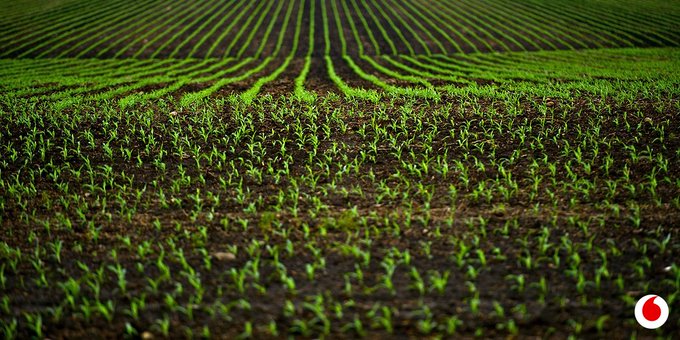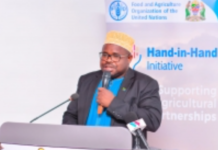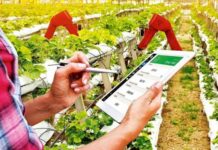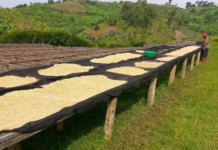Digitising the agricultural sector enables farmers to enhance their business and profitability while opening possibilities to the benefits of next generation technology.
In May 2020, Vodacom launched 5G services in South Africa, making use of an assigned temporary spectrum during the COVID-19 crisis. The company is in the process of building a national 5G network in the near future, strengthening its role in the Fourth Industrial Revolution (4IR). More than just an upgrade from 4G, 5G (or fifth generation wireless broadband technology) increases connectivity, offering high speed, improved coverage and greater stability. Add the benefit of lower latency (the ability to transfer lots of data with minimal delay) and it’s no wonder the World Economic Forum has cited that 5G will contribute $13.2 trillion to the global economy by 2035.
The transformative effect of 5G on the agricultural sector is significant and the application of the technology will facilitate the future of Internet of Things (IoT) in farming, providing real-time data on almost every aspect, from weather conditions to power consumption, livestock movements, maintenance issues, and market prices. Utilising the advantages of 5G technology, farmers will be able to unlock the development of smart technologies, such as artificial intelligence (AI), machine learning and cloud-based data systems, to be more efficient while enhancing their productivity and profitability.
The role of 5G in Smart Farming
Faster than other networks and with more capacity, 5G can transmit a massive amount of data at high speed. This makes it ideal for communicating quickly between agricultural devices, such as sensors, drones, machinery, and even other systems anywhere in the world. AI and cloud-based data analytics systems, which run on 5G, can utilise this data to inform decisions and develop a program specifically for a farm, taking into account the findings from the property. This precision agriculture or ‘smart farming’ can turn an agriculture business into an intelligent business with sustainable productivity.
For example, Vodacom’s MyFarmWeb is an integrated digital solution that collates and merges agricultural data sets through technology to provide useful digitised insights, and support farmers in their day to day business. The AfriGIS (Geographical Information Systems) enables technicians to capture, store and analyse information, including weather patterns, surface water area and risk factors, to promote precision farming, thereby turning farming investments of time, inputs and labour into profits. Our partner and subsidy ecosystem is innovatively future proof with Mezzanine where Vodacom continues to co-create and lead with technology. To date, MyFarmWeb is used by 3 600 farmers, with 950 000 hectares of commercial farming mapped in South Africa.
Precision agriculture relies on 5G-connected farm machinery powered by data, which can also help automate agricultural processes. Autonomous vehicles, like self-driving tractors, or robotics have more reliable, high speed connections for greater efficiency through 5G, while tasks such as harvesting, tracking livestock, and irrigation can be quicker and more cost-effective when digitally automated. Through 5G-enabled Internet of Things (IoT), farmers can make big advancements in water management, livestock safety and crop monitoring, increasing productivity and sustainable growth in the agriculture sector.
Opening doors in agribusiness
With greater coverage and reliability, 5G enhances cloud-based digital platforms and services that can assist agribusiness in engaging with smallholder farmers to drive enterprise development, job creation and a more productive economy. The Vodacom Business Connected Farmer app, provides small-scale farmers with access to markets, financial services, information, other farmers in the ecosystem, and agribusiness enterprises. The app offers secure and scalable paperless and cashless solutions for transactions, for greater efficiency at lower risk, and enables continuous education and skills training within the agri-industry via mobile technology. Digitalisation empowers small-scale farmers to compete both domestically and internationally, while having the means to adopt new technologies.
The Connected Farmer app has been introduced to the Vodacom Foundation’s programme to train female farmers in ICT skills so that they can be equal and active participants in the agricultural economy. The initiative, in partnership with United Nations Women and South African Women in Farming, has so far provided digital literacy education to more than 1 000 female farmers from rural areas in South Africa, and more than 250 farms registered with profiles on the Connected Farmer app between February and March this year. By connecting these women and enterprises, and through facilitating skills development, the app can help with achieving business success in a digital world.
5G opens the door to new and better ways of doing things in agriculture. 5G-enabled smart farming and automated processes will allow farmers to be more informed and efficient. 5G-enhanced cloud-based services provide farmers with not only access to information and a digital market, but increased communication and collaboration within the agribusiness sector, as well as having the power to educate and empower. Hopefully, through 5G connectivity, digital technology in agriculture will improve yields and increase productivity at higher profits, while widening opportunities for employment, and addressing food security in the global economy.









